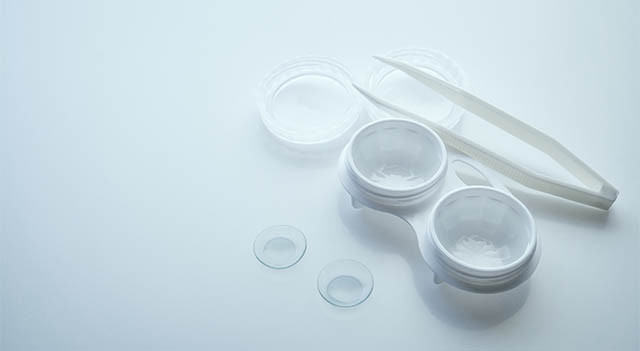Once you and your doctor have decided on the type of contact lenses you'll need, it's time to choose the most suitable contact lens solution for your eyes and contacts.
There exist 2 different types of solution for contact lenses: Multipurpose and Hydrogen Peroxide-based. While both remove debris and build-up, and disinfect lenses, only hydrogen peroxide is capable of penetrating the microbial biofilms for a deeper clean. As an added benefit, hydrogen peroxide does not contain preservatives — which can be particularly beneficial for those with allergies or eye sensitivities.
Multipurpose Solution
Multipurpose solutions are straightforward and easy to use; only one solution is needed to rinse, clean, disinfect and store your contacts (as seen in the image). Their convenience and low cost make them a popular choice.
Hydrogen Peroxide Solution
Hydrogen peroxide solutions, such as Clear Care® by Alcon or Refine One Step™ by CooperVision, contain no preservatives or allergens. This solution thoroughly breaks up the proteins and removes deposits on the lenses during the disinfection process, which can be beneficial for people who tend to accumulate large amounts of build-up on their lenses. Moreover, hydrogen peroxide is more effective at battling acanthamoeba keratitis (an eye infection that may lead to blindness) than all other types of contact lens solutions.
Since hydrogen peroxide is a chemical that causes stinging and burning when it touches the eye, after the contacts have been disinfected the solution must be neutralized to be healthy for your eyes. Included with every solution bottle is an upright contact lens case containing a platinum-coated disk that chemically reacts with hydrogen peroxide to decompose it into a safe, non-irritating, sterile saline solution. This chemical reaction produces bubbles inside the case as it undergoes the transformative process over a period of several hours. Since the neutralizing disk loses its effectiveness over time, it is critical to regularly replace it.
If your eyes do make contact with hydrogen peroxide, make sure to immediately flush it out with sterile saline. If saline is not available, wash your eyes with water or artificial tear drops and make sure to see Dr. Arlene Schwartz as soon as possible. Though painful, it doesn't cause permanent eye or vision damage.
How does it work?
To clean your lenses, place them in the designated case that is freshly filled with the hydrogen peroxide solution and soak them for 6-8 hours. This can be a one-step or two-step process, depending on the product. The one-step products contain a built-in neutralizer in the contact lens case, while the two-step products require you to add a neutralizing tablet to the solution after cleaning.
Make sure not to reuse or top off hydrogen peroxide solution after it has been neutralized, as it will have lost its disinfecting power.
Be sure to dry your case thoroughly between uses and to replace your case every 2-3 months to prevent infection.
It is important to note that hydrogen peroxide solutions will change into unpreserved saline. Therefore, if contact lenses are stored for extensive periods of time (e.g. more than a couple days), it is safer to consider multiple-purpose solutions for long term.
Hydrogen peroxide-based solutions are known for their exceptional disinfecting ability. At Hartsdale Family Eyecare, in Hartsdale, our patients are extremely satisfied with the cleanliness and comfort they experience when using hydrogen peroxide-based solutions for their contact lenses. Speak with Dr. Arlene Schwartz to find out whether this solution is right for you.

